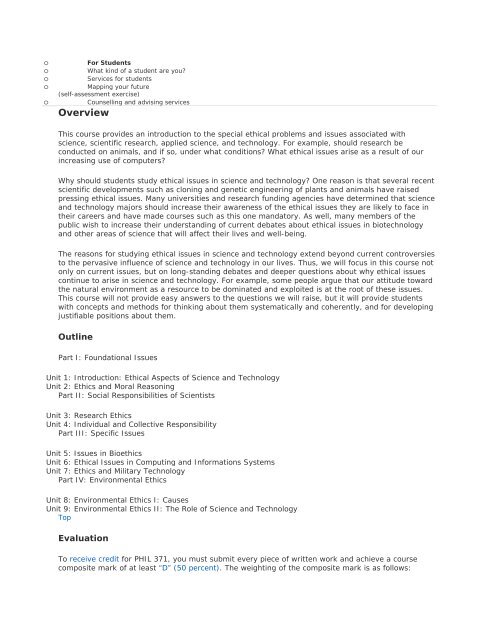Philosophy (PHIL) 252 Critical Thinking (Revision 7)
Philosophy (PHIL) 252 Critical Thinking (Revision 7)
Philosophy (PHIL) 252 Critical Thinking (Revision 7)
Create successful ePaper yourself
Turn your PDF publications into a flip-book with our unique Google optimized e-Paper software.
o<br />
o<br />
o<br />
o<br />
o<br />
For Students<br />
What kind of a student are you?<br />
Services for students<br />
Mapping your future<br />
(self-assessment exercise)<br />
Counselling and advising services<br />
Overview<br />
This course provides an introduction to the special ethical problems and issues associated with<br />
science, scientific research, applied science, and technology. For example, should research be<br />
conducted on animals, and if so, under what conditions? What ethical issues arise as a result of our<br />
increasing use of computers?<br />
Why should students study ethical issues in science and technology? One reason is that several recent<br />
scientific developments such as cloning and genetic engineering of plants and animals have raised<br />
pressing ethical issues. Many universities and research funding agencies have determined that science<br />
and technology majors should increase their awareness of the ethical issues they are likely to face in<br />
their careers and have made courses such as this one mandatory. As well, many members of the<br />
public wish to increase their understanding of current debates about ethical issues in biotechnology<br />
and other areas of science that will affect their lives and well-being.<br />
The reasons for studying ethical issues in science and technology extend beyond current controversies<br />
to the pervasive influence of science and technology in our lives. Thus, we will focus in this course not<br />
only on current issues, but on long-standing debates and deeper questions about why ethical issues<br />
continue to arise in science and technology. For example, some people argue that our attitude toward<br />
the natural environment as a resource to be dominated and exploited is at the root of these issues.<br />
This course will not provide easy answers to the questions we will raise, but it will provide students<br />
with concepts and methods for thinking about them systematically and coherently, and for developing<br />
justifiable positions about them.<br />
Outline<br />
Part I: Foundational Issues<br />
Unit 1: Introduction: Ethical Aspects of Science and Technology<br />
Unit 2: Ethics and Moral Reasoning<br />
Part II: Social Responsibilities of Scientists<br />
Unit 3: Research Ethics<br />
Unit 4: Individual and Collective Responsibility<br />
Part III: Specific Issues<br />
Unit 5: Issues in Bioethics<br />
Unit 6: Ethical Issues in Computing and Informations Systems<br />
Unit 7: Ethics and Military Technology<br />
Part IV: Environmental Ethics<br />
Unit 8: Environmental Ethics I: Causes<br />
Unit 9: Environmental Ethics II: The Role of Science and Technology<br />
Top<br />
Evaluation<br />
To receive credit for <strong>PHIL</strong> 371, you must submit every piece of written work and achieve a course<br />
composite mark of at least “D” (50 percent). The weighting of the composite mark is as follows:

















